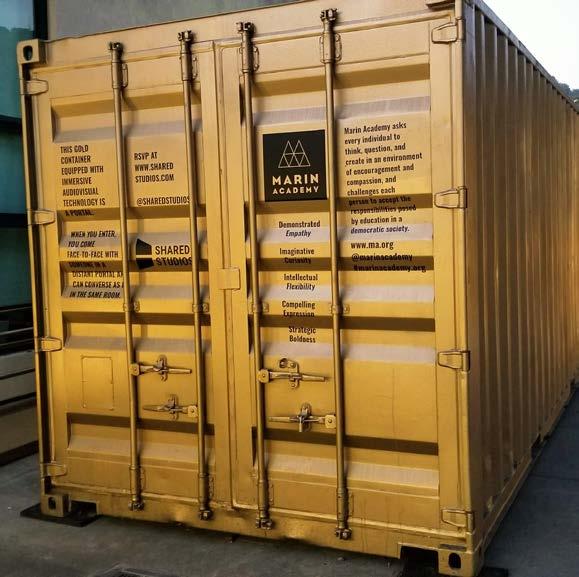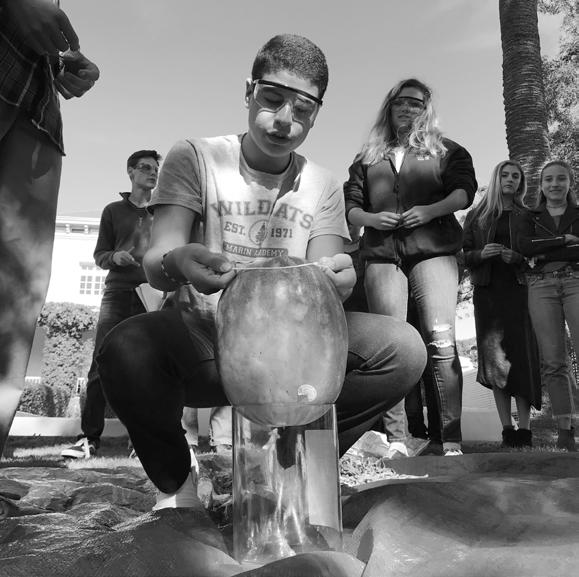How can you redefine your education?

A liberal arts education has always been one based on intellectual curiosity and ambition. Today it must be more than that: a liberal arts education must cultivate the tools necessary to navigate the world’s most challenging issues—and engage students directly in that work.

An academic opportunity for focused engagement on complex issues and problem solving in commuities beyond the classroom.
TRANSDISCIPLINARY LEADERSHIP
PROGRAM:

Transdisciplinary learning best reflects the ways in which students will engage the world beyond high school, where ideas and problems are rarely approached alone or through a single lens.

What Is Transdisciplinary Learning?
Transdisciplinary learning has two essential elements:
1 2
An authentic, relevant, and complex issue at its core
A need for students to operate within, between, and beyond disciplines as they approach and address the issue
What Is the Transdisciplinary Leadership Program?
A leadership orientation and retreat as an introduction to the program and your team



Leadership opportunities presented through TLP course design
A two-block, one-semester transdisciplinary course during the first semester of senior year
A culminating project in partnership with organizations beyond MA

the nuances and complexities of societal issues, the different ways experts are approaching them, and the experiences of the people affected understand empathy, cultural competency, and agency while harnessing natural curiosity strengthen
with institutions of higher learning, nonprofit organizations, companies, and local governments partner
new solutions and approaches that bring a perspective of inclusivity and equity to complex problems +develop design
existing skills and knowledge while learning new skills and content within, between, and beyond academic disciplines transfer + apply
What Is the Transdisciplinary Course?

Each year TLP faculty offers 1-credit courses (2 blocks, one semester) that focus on a pressing complex, authentic, and relevant issue in contemporary society. During the first half of the course, students develop contextual knowledge through readings, research, and engagement in a series of conversations and activities with local, state, and national leaders. During the second half of the course, students apply what they have learned and leverage their skills and interests as they research, propose, and, if possible, implement solutions to address that semester’s problem or question.
Components of Each Transdisciplinary Course
2 Teachers

2 Blocks Outside Partnership Project-Based Learning
Independence + Cooperation
Students are guided by two teachers from different disciplines. The course runs during two adjacent blocks, allowing for both flexibility and depth.
The amount of time and scheduling allows for meaningful partnerships with outside experts and organizations.


Students learn what is necessary to see their work to completion. A mix of lecture, exploration, project time, offcampus work, research, and online learning are utilized.
Students utilize initiative, autonomy, and follow through while working to cooperatively design and implement ways to address a timely and real-world issue.

“I will remember TLP as the most conscious, exciting, interesting, and relevant class (I took).”
STUDENT QUOTES
“The relevance in this class stands out among other classes. I think about this class so much when I’m not in it; it impacts the way I see the world.”
“(In) most classes, teachers tell you what they know. In this class, there is so much discussion, we get to talk and think together. I don’t think people realize how revolutionary transdisciplinary learning is.”
“With the skills I have learned in TLP, I now realize that it is not unimaginable to make a profound impact on the world one day - to save it, perhaps, even. I have loved learning in such a comprehensive, relevant way.”
– Climate Justice TLP Student

the intersection with technology. I had previously never thought of working in or in partnership with the public sector, but it’s now pretty substantially on my radar as a path I’d like to go on.”
“(T)his course has given me a pretty strong interest in civics, government, politics, and, of course,
– Future Cities TLP Student
2022–2023 Course Options
Future Cities: Civic Tech, Data Science, and Design
How might we build our cities for a more just, sustainable, and beautiful future?
By 2030, 125 billion connected devices are expected to be part of our daily lives. By 2050, more than 60% of the world’s population is expected to live in urban environments. Around the globe, hundreds of new cities are being built from the ground up to meet these changing demands. More and more, city planners and stakeholders are examining how to gather and use data and technology to improve infrastructure, liveability, and sustainability in our rapidly growing and changing urban centers--our future cities. With this comes many questions: What are our future cities’ greatest needs and challenges? What kind of data and technology is most helpful to the city and its citizens? What data should be publicly open to increase idea generation and innovation? How is data privacy and security ensured? Is equitable access for all citizens achievable? Focusing on human-centered design, data science, and English skills, you’ll dive into data analysis and statistics, city planning and design, and theory and ethics around future-based visioning. Learning from case studies, speakers, history, literature, and more, you will gain a deeper understanding of the complex interplay between humans and technology, government, and the people. In the second half of the class, you will apply your skills and knowledge while working in partnership with the City of San Rafael to design, prototype, iterate, and eventually present a proposal to city officials that responds to the challenges they share with our class.
Credits Received: .5 English Credit, .5 Math Credit
2022–2023 Course Options
Climate Justice: Science, Culture, and The Stories We Tell about Climate
What are the cultural and scientific roots of our current ecological emergency? How might we take action in our community to address equitable mitigation and adaptation systems to address the climate crisis?
“I used to think the top environmental problems were biodiversity loss, ecosystem collapse, and climate change. I thought that with thirty years of good science we could address those problems. I was wrong. The top environmental problems are selfishness, greed, and apathy. And to deal with those we need a spiritual and cultural transformation. And we scientists don’t know how to do that.” - Gus Speth, Environmental lawyer and scientist quoted in Generation Dread. Speth’s observation will drive our quest to understand climate change as a human rights and social justice issue. This course will give you a foundational understanding of the causes of, effects of, and ways to mitigate and adapt to climate change so you can take action in your communities. You will examine and explore the scientific roots of our current ecological crisis and trace the evolution and impact of colonizing and extractive Western culture that has driven the current climate crisis by merging ideas from historians, activists, and voices from around the world where the effects of climate change have hit early and hard. Through writings, videos, guest lectures, place-based activities, and a concurrent service project, you will develop the awareness, skills, and leadership abilities necessary to address the needs of a local organization in your final project and to contribute to a sustainable, equitable and just future for our communities and the planet.
Credits Received: .5 English Credit, .5 Science Credit

Can Leadership Be Taught?
Students begin the year with a day-long retreat led by an outside leadership specialist. 1 2
During the transdisciplinary course, students hear from and work with leaders in fields related to that semester’s topic.
Research consistently shows that leadership is primarily developed through experience—though how to hone and practice leadership can be learned. The Transdisciplinary Leadership Program focuses on both these realms; the course, leadership role, and capstone give students real-world experience to practice and to develop their leadership skills while specific lessons and tasks are designed to help focus students on strong leadership traits and practices. 3
Developed by TLP faculty and leadership experts, the transdisciplinary course has a dedicated curriculum devoted to leadership readings, activities, and assignments.
Leadership and learning are indispensable to each other.
– John F. Kennedy
What Are the Course Leadership Opportunities?
Growing leadership skills requires practice. As such, each TLP course has leadership requirements and opportunities. Students will sign up to serve on panels, interview speakers, give public presentations, and more. In addition, multiple leadership opportunities within the class itself will evolve, and the hope is these learnings will transfer to other leadership moments in students’ lives.
At the end of second semester, all seniors are required to complete a 3-week, 105-hour senior project. For students in TLP, this project will be their TLP capstone and will be spent—either individually or as part of a group—working to address a larger societal issue with people/organizations outside of MA. This capstone project will commence in the fourth quarter as an extension of student work in the course, and it will be an opportunity to demonstrate the thoughtful and nuanced way that they have learned to examine an issue and design and implement solutions.
What Is the Capstone Project?
c
This looks like something I want to get involved with—what’s the
process to be a part of TLP?
1
Make sure you understand both the opportunity of the program and commitment necessary. Read through the information packet, come to an information session (Feb. 15, 12:30pm in the BBLC Lecture Hall), and discuss the program with your parents/ guardians, advisor, and other adult mentors.
2 Fill out the application and electronically submit it, per instructions, no later than Friday, March 13, 2023, 3:30 pm.
3 You will hear about acceptance into the program no later than Friday, March 24.

What are my responsibilities if I join TLP?
u Commit to being a part of a team. The social change model of leadership encourages you to step out of your comfort zone and to bring out the best of the others in your cohort.
u Attend and engage in a full-day leadership retreat on Sunday, August 20, 2023.
u Bring flexibility, a positive outlook, engagement, and commitment to your fall course and partner organization. Some days you will be off campus for the bulk of the day, some days will require more independent work, and some days will feel like “regular” class days. Be curious, open, and dedicated!
u Commit to a capstone project (senior project) that works to address a larger societal issue with people/organizations outside of MA. This includes following specific guidelines, including meeting with one of your TLP teachers during quarters 3 and 4 to make sure your project meets all capstone requirements.
u Give feedback at various times throughout the year and, if requested, share your experience and information about the program (at open houses, information sessions, etc.). Your voice and ideas are essential as we learn and evolve the program together. Your feedback will be used both in real time and in future iterations.
Ready to Apply?

















